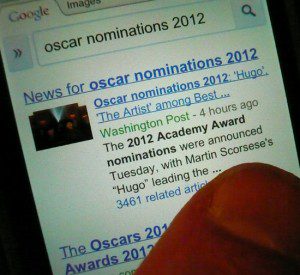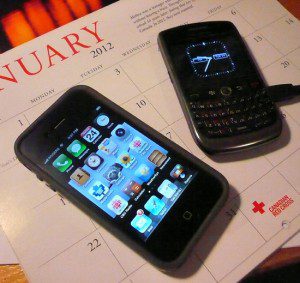
Earlier this week, in a news-reporting course I teach at Centennial College, something suddenly interrupted the classroom discussion. It was just after 8:30 on Tuesday morning and a number of my students had their heads down. I recognized the posture. They were texting on their smartphones beneath their desks. I was about to call them on it, when I realized the source of the distraction.
“Oscar nominations just out,” one of them admitted to me.
I knew there was no point trying to compete with Best Actor, Best Actress or Best Picture nominations. So I joined in, “War Horse get nominated?” I asked.
“Yup, along with ‘Moneyball,’ ‘Extremely Loud and Incredibly Close’ and ‘The Help.’”
Ultimately, the interruption didn’t particularly bother me. Frankly, I was just as curious about the nominations. I’m also not so arbitrary that I don’t allow cellphones in my classes; some of my students are single parents who need immediate access to their child-care providers, so I try to accommodate them, in case of emergencies. But I later asked another student why the announcement of the Academy Awards nominations was so important. It didn’t strike me as their kind of priority.
She rolled her eyes at the question, as if to say: “Don’t be silly. I just gotta know!”
Isn’t it odd that getting the information, even if it isn’t your style, may have become even more important than the information itself. Not only that, but getting the information first has also become so vital, even some sort of status symbol. Once upon a time, in newsrooms a teletype machine, a fax or a telephone seemed fast enough. Today, however, not only is access vital, but instant access is also mandatory, to the point of embarrassment if one’s smartphone, service provider or application doesn’t deliver it instantly.
I don’t have a problem with that get-it-first emphasis provided there’s some maturity thrown in. I just think that with speed of access comes a lot of additional baggage that some people – particularly young people – don’t handle very well. In recent weeks, a number of friends and I have talked about increased stress, mental depression and even self-doubt among youth in our community. In our search for answers, some of us have talked about the prevalence of social media and the need for speed among those same young people.
For sure, high-speed information technology and networks make elementary and high school students more competitive when used positively. On the other hand, when Facebook, Twitter, YouTube, MySpace, Flikr and Kaboodle are used to compete purely for social status or to bully others, they become destructive tools. I mean I’ve heard Twitter users say:
“I’ve got hundreds following my tweets.” Of course, the implication is “And you don’t.” Or, “How many friends do you have on Facebook?” As if to say, “You’re a loser.”
The Fraser Valley gang rape and subsequent video release on Facebook in 2010, not to mention the video self-portraits posted on the web by Vancouver Stanley Cup rioters last spring further illustrate the abuse of cellphones in immature hands. That’s when the need for speed hurts. That’s the way smartphones spawn dumb use. And that’s when “I just gotta know” runs amuck.

But if you think our discussion of the harmful impact of these technologies is little more than fear-mongering, read on.
The other day, on CBC Radio, I heard several students talking about a unique experiment. They all described abandoning their smartphones, ear buds, email accounts and texting screens for a full week. No. It wasn’t punishment for getting caught in the classroom. In fact, it was just the opposite. About 20 Grade 11 and 12 students at Greenwood College School in Toronto volunteered for what their teacher Garth Nichols called “digital detox,” to help put their dependence on smartphone technology into perspective.
“Students are invited to choose a meaningful piece of technology and give it up … from Friday to Friday,” he said. “They keep a journal by commenting on their reactions to living without their devices.”
Nichols explained the “technoses check” is part of the school’s Challenge and Change in Society curriculum that helps students examine the psychology, sociology and anthropology of their world; in other words, he said, the forced deprivation of their tech toys helps them understand phenomena that are bigger than they are.

He said the concept came from a book, “Hyperculture: The Human Cost of Speed,” by Canadian author, Dr. Stephen Bertman, who writes that society’s dependence on technology can cause unbridled commercialism, the degradation of the environment and even the disintegration of the family. The week-long techno-fast wasn’t mandatory; some students admitted they couldn’t last seven days and opted out.
“I love my technology too,” Nichols admitted. “[But] by raising awareness of our addiction … [students] recognize we shape our tools and our tools shape us.”
Maybe that kind of acknowledgment belongs in every smartphone user manual.